Items filtered by date: October 2023
Running Injuries That Affect the Feet and Ankles
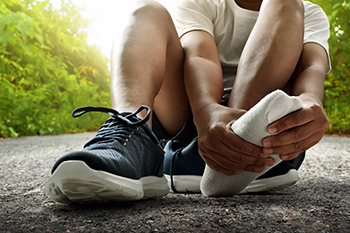
Running is a fantastic way to stay fit, boost cardiovascular health, and enjoy the great outdoors. Despite its many benefits, running can also take a toll on your feet and ankles. More than 80 percent of running injuries are attributed to repetitive stress, making it important for runners to be aware of the potential pitfalls and methods to prevent and address them. The repetitive impact of every foot strike during your runs can put significant stress on your muscles, joints, and connective tissues, increasing the risk of injury. Foot injuries are a significant concern for runners. Plantar fasciitis, metatarsalgia, and stress fractures are some of the more common conditions that can affect the feet. These injuries can cause intense pain, particularly during the push off phase of running. Ankles are susceptible to sprains, strains, and ligament injuries in runners. Running on uneven terrain and wearing improper footwear can contribute to these injuries, which may result in instability and limited mobility. If you experience pain or discomfort in the feet or ankles from your running, it is suggested that you make an appointment with a podiatrist for an exam, diagnosis, and tips for preventing injuries.
Exercising your feet regularly with the proper foot wear is a great way to prevent injuries. If you have any concerns about your feet, contact Patrice Antero, DPM of Tuscany Podiatry. Our doctor will treat your foot and ankle needs.
How to Prevent Running Injuries
Many common running injuries are caused by overuse and overtraining. When the back of the kneecap starts wearing out and starts causing pain in your knee, this is commonly referred to as runner’s knee. Runner’s knee is a decrease in strength in your quadriceps and can occur if you’re not wearing properly fitted or supporting shoes. To prevent runner’s knee, focusing on hip strengthening is a good idea, as well as strengthening your quads to keep the kneecaps aligned.
What Are Some Causes of Running Injuries?
- One cause of a common running injury is called iliotibial band syndrome.
- Plantar fasciitis is also another common injury.
- Stress fractures can occur from overtraining, lack of calcium, or even your running style.
Best Ways to Prevent Running Injuries
- Wear footwear that fits properly and suits your running needs.
- Running shoes are the only protective gear that runners have to safeguard them from injury.
- Make a training schedule. Adding strengthening exercises as well as regular stretching can help keep you strong and limber and can lessen the possibility of injuries.
- Stretching keeps muscles limber; this will help you gain better flexibility.
If you have any questions please feel free to contact our office located in Tuscaloosa, AL . We offer the newest diagnostic and treatment technologies for all your foot and ankle needs.
Common Symptoms of Morton's Neuroma
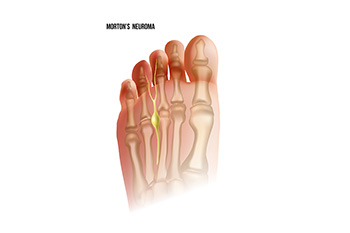
Morton's neuroma is a foot condition that often goes under the radar but can cause significant discomfort. It occurs when the tissue surrounding the nerves leading to the toes thickens, resulting in nerve compression. This compression can lead to a variety of unpleasant symptoms. Foremost is pain, typically felt in the ball of the foot or between the third and fourth toes. This pain is often described as a sharp or burning sensation, and patients may liken it to having a pebble in their shoe. Many individuals with Morton's neuroma experience tingling or numbness in the affected toes. Symptoms can worsen with activities that place pressure on the foot, such as walking or wearing tight shoes. If you are experiencing signs of Morton’s neuroma, it is suggested that you confer with a podiatrist who can properly diagnose and treat this condition.
Morton’s neuroma is a very uncomfortable condition to live with. If you think you have Morton’s neuroma, contact Patrice Antero, DPM of Tuscany Podiatry. Our doctor will attend to all of your foot care needs and answer any of your related questions.
Morton’s Neuroma
Morton's neuroma is a painful foot condition that commonly affects the areas between the second and third or third and fourth toe, although other areas of the foot are also susceptible. Morton’s neuroma is caused by an inflamed nerve in the foot that is being squeezed and aggravated by surrounding bones.
What Increases the Chances of Having Morton’s Neuroma?
- Ill-fitting high heels or shoes that add pressure to the toe or foot
- Jogging, running or any sport that involves constant impact to the foot
- Flat feet, bunions, and any other foot deformities
Morton’s neuroma is a very treatable condition. Orthotics and shoe inserts can often be used to alleviate the pain on the forefront of the feet. In more severe cases, corticosteroids can also be prescribed. In order to figure out the best treatment for your neuroma, it’s recommended to seek the care of a podiatrist who can diagnose your condition and provide different treatment options.
If you have any questions, please feel free to contact our office located in Tuscaloosa, AL . We offer the newest diagnostic and treatment technologies for all your foot care needs.
Children’s Custom Orthotics
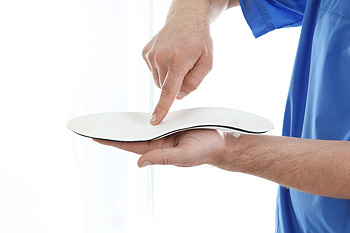
Children's orthotics may be needed to support their foot growth and development. However, knowing when to seek the counsel of a podiatrist is vital. Typically, before the age of three, concerns related to a child's gait naturally resolve as their muscles and foot structures mature. In these early years, orthotics are seldom necessary, and simple shoe adjustments or exercises may suffice. Yet, specific signs should prompt consultation. For example, flat feet can lead to joint pain and posture issues, warranting attention. Likewise, if a child's feet point inward or outward, it is crucial to address this to prevent long-term muscle imbalances and mobility problems. Some foot deformities, such as hammertoes and bunions can be corrected with orthotics if addressed promptly. Abnormal shoe wear, recurring foot pain, and rapid fatigue during physical activities can all indicate underlying foot problems. In most cases, custom foot orthotics effectively address these concerns, facilitating proper development without pain. If you have any questions about your child's foot health, it is suggested that you make an appointment with a podiatrist for professional guidance.
If you are having discomfort in your feet and would like to try orthotics, contact Patrice Antero, DPM from Tuscany Podiatry. Our doctor can provide the care you need to keep you pain-free and on your feet.
What Are Orthotics?
Orthotics are inserts you can place into your shoes to help with a variety of foot problems such as flat feet or foot pain. Orthotics provide relief and comfort for minor foot and heel pain but can’t correct serious biomechanical problems in your feet.
Over-the-Counter Inserts
Orthotics come in a wide variety of over-the-counter inserts that are used to treat foot pain, heel pain, and minor problems. For example, arch supports can be inserted into your shoes to help correct overarched or flat feet, while gel insoles are often used because they provide comfort and relief from foot and heel pain by alleviating pressure.
Prescription Orthotics
If over-the-counter inserts don’t work for you or if you have a more severe foot concern, it is possible to have your podiatrist prescribe custom orthotics. These high-quality inserts are designed to treat problems such as abnormal motion, plantar fasciitis, and severe forms of heel pain. They can even be used to help patients suffering from diabetes by treating foot ulcers and painful calluses and are usually molded to your feet individually, which allows them to provide full support and comfort.
If you are experiencing minor to severe foot or heel pain, it’s recommended to speak with your podiatrist about the possibilities of using orthotics. A podiatrist can determine which type of orthotic is right for you and allow you to take the first steps towards being pain-free.
If you have any questions please contact our office located in Tuscaloosa, AL . We offer the newest diagnostic and treatment technologies for all your foot and ankle needs.
How Shoes Can Affect Your Foot Health
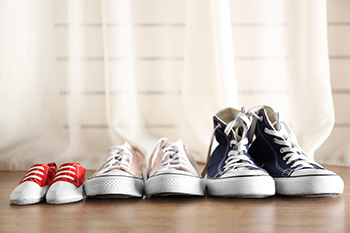
Proper footwear is essential for preventing various foot conditions and discomfort. Here are some key considerations to keep in mind when choosing your footwear. Those who stand for extended periods on hard surfaces like concrete may experience heel and forefoot pain and calluses and corns. Opt for supportive shoes with softer soles and arch support to alleviate these stresses. This helps distribute your weight more evenly and reduces pressure on the feet. If you have foot soreness, consider lace-up boots. These boots can help maintain leg alignment and distribute even pressure on the muscles and ligaments around your foot. While high heels may be fashionable, they can cause forefoot pressure and deformities. By limiting their use, you can promote better foot health. For those engaged in physical activities, look for shoes that provide cushioning for shock absorption during activities such as running and jumping. Flexibility at the ball of the foot and proper heel support are other essential features. For further help with taking care of your feet through appropriate footwear, it is suggested that you seek the help of a podiatrist.
Everyday foot care is very important to prevent infection and other foot ailments. If you need your feet checked, contact Patrice Antero, DPM from Tuscany Podiatry. Our doctor can provide the care you need to keep you pain-free and on your feet.
Everyday Foot Care
Often, people take care of their bodies, face and hair more so than they do for their feet. But the feet are a very important aspect of our bodies, and one that we should pay more attention to. Without our feet, we would not be able to perform most daily tasks.
It is best to check your feet regularly to make sure there are no new bruises or cuts that you may not have noticed before. For dry feet, moisturizer can easily be a remedy and can be applied as often as necessary to the affected areas. Wearing shoes that fit well can also help you maintain good foot health, as well as making it easier to walk and do daily activities without the stress or pain of ill-fitting shoes, high heels, or even flip flops. Wearing clean socks with closed shoes is important to ensure that sweat and bacteria do not accumulate within the shoe. Clean socks help to prevent Athlete’s foot, fungi problems, bad odors, and can absorb sweat.
If you have any questions please feel free to contact our office located in Tuscaloosa, AL . We offer the newest diagnostic and treatment technologies for all your foot and ankle needs.
Compelling Reasons to Pursue Podiatry
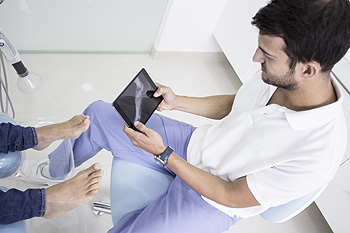
Studying podiatry is a unique and rewarding journey that offers several compelling reasons to consider. Podiatrists play a vital role in healthcare by specializing in the diagnosis, treatment, and prevention of conditions related to the foot, ankle, and lower extremities. This specialization addresses a significant and often underestimated aspect of overall health. Additionally, podiatry offers diverse career opportunities. Graduates can work in various settings, including private practices, hospitals, sports medicine clinics, and research institutions. The ability to choose from different specialties within podiatry, such as sports medicine, surgery, or geriatrics, adds to the versatility of the field. Furthermore, the demand for podiatrists continues to grow as the population ages and becomes increasingly aware of the importance of foot health. Podiatry offers a stable and potentially lucrative career path. Ultimately, studying podiatry provides the chance to make a tangible difference in people's lives by improving their mobility, relieving pain, and enhancing their overall well-being. It is a profession that combines medical expertise with patient care, making it a fulfilling and impactful choice for those interested in healthcare. If you are interested in pursuing a career in podiatry, it is suggested that you discuss any questions or concerns with this type of doctor who can help you make an informed decision.
If you are experiencing pain in the feet or ankles, don’t join the stubborn majority refusing treatment. Feel free to contact Patrice Antero, DPM from Tuscany Podiatry. Our doctor can provide the care you need to keep you pain-free and on your feet.
What Is a Podiatrist?
Someone would seek the care of a podiatrist if they have suffered a foot injury or have common foot ailments such as heal spurs, bunions, arch problems, deformities, ingrown toenails, corns, foot and ankle problems, etc.
Podiatric Treatment
A podiatrist will treat the problematic areas of the feet, ankle or lower leg by prescribing the following:
- Physical therapy
- Drugs
- Orthotic inserts or soles
- Surgery on lower extremity fractures
A common podiatric procedure a podiatrist will use is a scanner or force plate which will allow the podiatrist to know the designs of orthotics. Patients are then told to follow a series of tasks to complete the treatment. The computer will scan the foot a see which areas show weight distribution and pressure points. The podiatrist will read the analysis and then determine which treatment plans are available.
If you have any questions please feel free to contact our office located in Tuscaloosa, AL . We offer the newest diagnostic and treatment technologies for all your foot and ankle needs.



